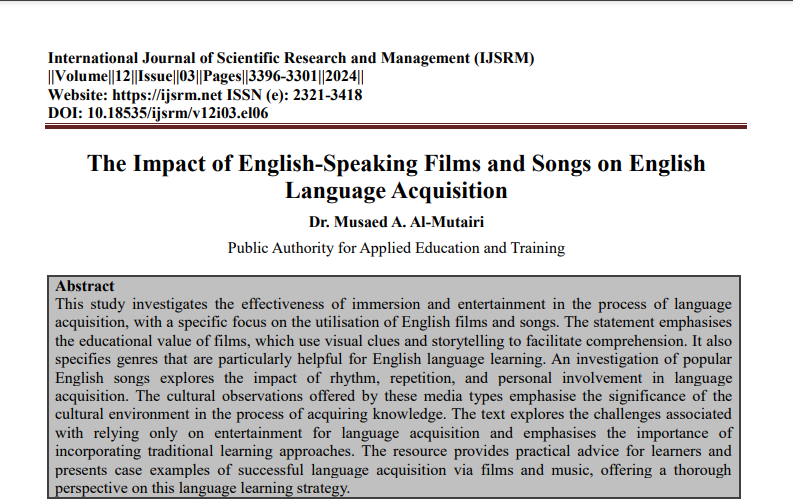
Submission to VIJ 2024-03-29
Keywords
- Language Learning,
- English as a Foreign Language,
- Language Acquisition
Copyright (c) 2024 Musaed A. Al-Mutairi

This work is licensed under a Creative Commons Attribution 4.0 International License.
Abstract
This study investigates the effectiveness of immersion and entertainment in the process of language acquisition, with a specific focus on the utilisation of English films and songs. The statement emphasises the educational value of films, which utilise visual clues and storytelling to facilitate comprehension. It also specifies genres that are particularly helpful for English language learning. An investigation of popular English songs explores the impact of rhythm, repetition, and personal involvement in language acquisition. The cultural observations offered by these media types emphasise the significance of cultural environment in the process of acquiring knowledge. The text explores the challenges associated with relying only on entertainment for language acquisition and emphasises the importance of incorporating traditional learning approaches. The resource provides practical advice for learners and presents case examples of successful language acquisition via films and music, offering a thorough perspective on this language learning strategy.
References
- Brown, H. D. (2007). Principles of Language Learning and Teaching. Pearson Education.
- Byram, M. (1989). Cultural Studies in Foreign Language Education. Multilingual Matters.
- Canale, M., & Swain, M. (1980). Theoretical Bases of Communicative Approaches to Second Language Teaching and Testing. Applied Linguistics, 1(1), 1-47.
- Ellis, R. (2005). Principles of Instructed Language Learning. System, 33(2), 209-224.
- Gardner, H. (1983). Frames of Mind: The Theory of Multiple Intelligences. Basic Books.
- Gass, S. M., & Mackey, A. (2000). Stimulated Recall Methodology in Second Language Research. Lawrence Erlbaum Associates.
- Kramsch, C. (1993). Context and Culture in Language Teaching. Oxford University Press.
- Krashen, S. D. (1982). Principles and Practice in Second Language Acquisition. Pergamon.
- Krashen, S., & Terrell, T. (1983). The Natural Approach: Language Acquisition in the Classroom. Alemany Press.
- Larsen-Freeman, D. (2000). Techniques and Principles in Language Teaching. Oxford University Press.
- Mayer, R. E. (2001). Multimedia Learning. Cambridge University Press.
- Schmidt, R. (1990). The Role of Consciousness in Second Language Learning. Applied Linguistics, 11(2), 129-158.
- Swaffar, J., & Arens, K. (2005). Remapping the Foreign Language Curriculum: An Approach through Multiple Literacies. Modern Language Association.
- Vygotsky, L. S. (1978). Mind in Society: The Development of Higher Psychological Processes. Harvard University Press.
- Wilkins, D. A. (1976). Notional Syllabuses: A Taxonomy and Its Relevance to Foreign Language Curriculum Development. Oxford University Press.